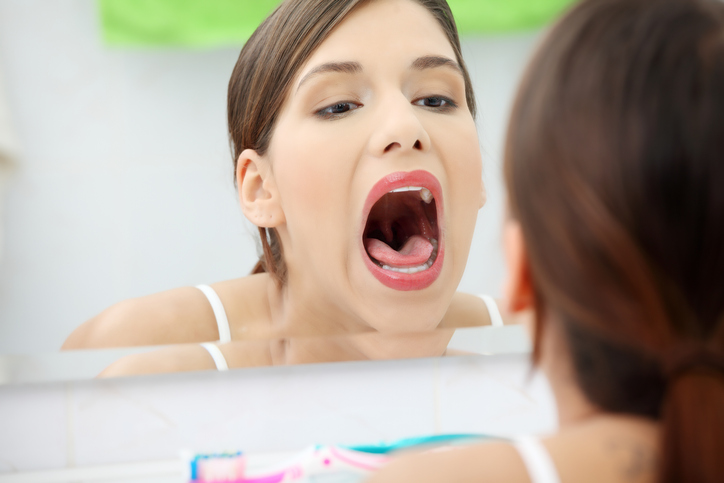
Dry mouth is rarely serious, but it can be uncomfortable and lead to other oral health issues. Luckily, there are several DIY remedies for it.
Saliva washes away food particles and neutralizes your mouth’s pH levels to protect your teeth from acids. However, if your mouth doesn’t have enough saliva, or if the glands responsible for producing saliva aren’t functioning properly, you may suffer from a dry, cottony-feeling mouth. Not only will dry mouth increase your risk of tooth decay, but it also makes your gums more vulnerable to gingivitis.
Anything from nutritional deficiencies to conditions like diabetes or oral thrush can cause dry mouth, or xerostomia. However, medications — such as antihypertensives, antihistamines, and bronchodilators — are the most common culprit behind it. In fact, medications cause over 90 percent of xerostomia cases!
Regardless of the cause, these 10 DIY remedies can help ease your symptoms and prevent further oral health issues from developing.
1. Drink Water
Dehydration is a common cause of xerostomia, so try to increase your water intake. Plus, drinking water will remove bacteria, keeping your mouth clean until your saliva production improves.
2. Use a Humidifier
Consider investing in a humidifier if you live in a dry climate or a house with dry air. If you’re having difficulty sleeping due to your dry mouth, using a humidifier can be particularly beneficial, as it will reduce your symptoms and enable you to get a better night’s sleep.
3. Breathe Through Your Nose
Try to breathe through your nose whenever possible, as breathing through your mouth can cause dryness — especially if you do so while sleeping. If allergies or congestion prevent you from breathing through your nose, talk to your doctor about resolving your allergies or congestion problems.
4. Chew Sugar-Free Gum
The physical act of chewing gum itself encourages saliva flow. However, to optimize salivary production, look for sugar-free gum with the ADA Seal of Acceptance or xylitol, a sugar alcohol (which, despite its name, doesn’t actually contain alcohol).
5. Suck on Sugar-Free Candies
Similarly, sucking on candies, lozenges, or mints will stimulate salivary secretion in your glands, offering temporary relief from your symptoms. When you have dry mouth, your risk of tooth decay is higher than usual. Adding sugary candies to your diet will only worsen your risk of decay, so make sure to buy sugar-free products.
6. Use Over-the-Counter Saliva Replacement Products
Over-the-counter saliva substitutes can keep your mouth moisturized. You can use these rinses, sprays, or toothpastes as often as you need. While these products can offer short-term relief, they won’t cure the underlying cause of your dry mouth.
7. Quit Smoking
Not only can smoking lead to lung cancer, heart disease, chronic obstructive pulmonary disease (COPD), and diabetes, but it can also slow down your saliva production and dehydrate you.
8. Avoid Caffeine
Because the tannins found in coffee and tea bind to saliva, caffeinated beverages like coffee or tea can be dehydrating. But don’t worry, you don’t have to completely cut caffeinated drinks out of your life — if you love coffee or tea, you can still drink the decaffeinated versions!
9. Rinse with an Alcohol-Free Mouthwash
Like caffeine, alcohol can lower your mouth’s moisture levels. It can decrease your salivary secretion, so you should only use an alcohol-free mouthwash when you have dry mouth.
If possible, use a mouthwash that contains xylitol, as it will increase saliva production. However, any alcohol-free mouthwash will be able to moisten your mouth.
10. Improve Overall Oral Care
Xerostomia is both a symptom and cause of poor oral hygiene habits, so it’s essential to brush and floss each day. To optimize your oral healthcare routine, use fluoride toothpaste and rinse your mouth once you’re done.
Seeking Professional Help
While these home remedies are a great starting point for managing symptoms, you may need to talk with your dentist to discuss the root cause of your dry mouth. If you believe your medications are causing the problem, your dentist can advise you on whether you should discontinue taking them. If you have depression, anemia, Parkinson’s disease, kidney disease, type 2 diabetes, anxiety, an immune disorder, or nutrient deficiencies, your doctor can also help treat these underlying health conditions.
At Espire, our dentists can thoroughly clean your teeth and answer any questions you may have. Contact us today!


